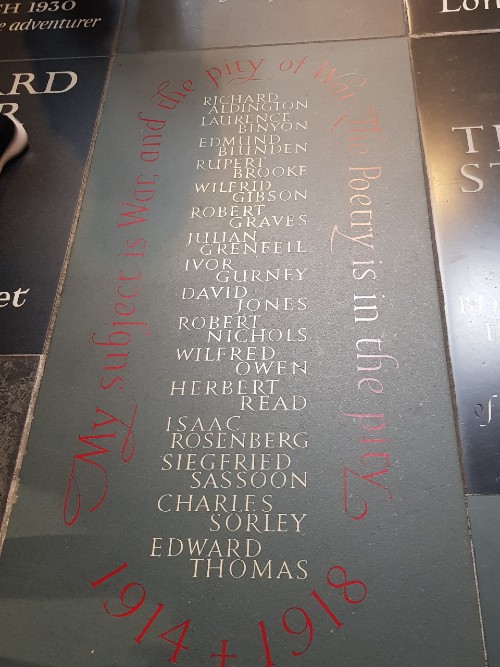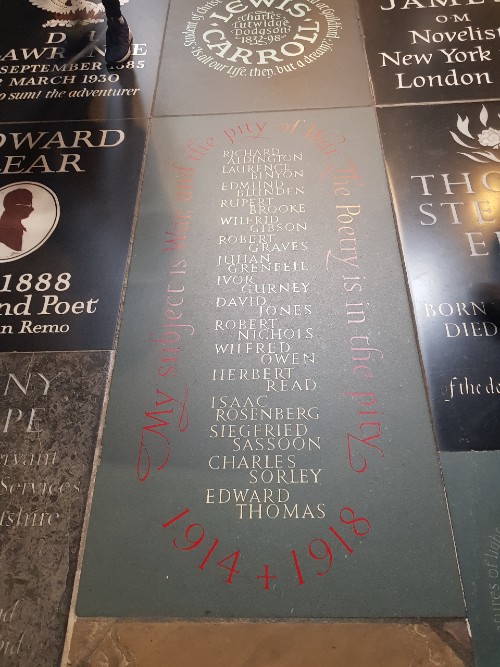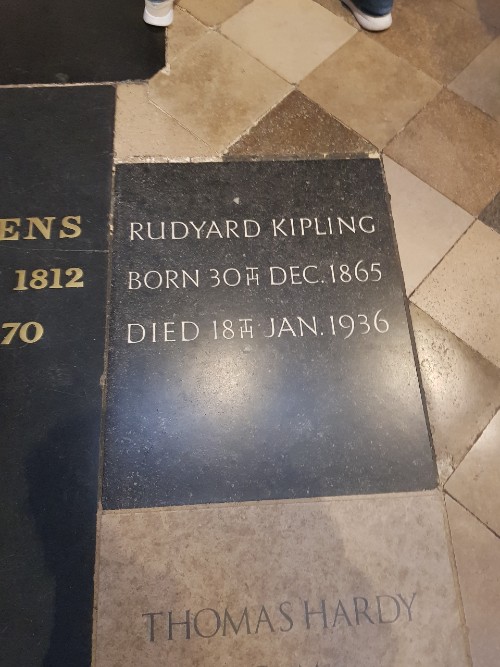Poets Corner Westminster Abbey
Sixteen poets of the Great War (World War I) are remembered on this memorial:
Richard Aldington (1892-1962) who served in the trenches and achieved success with his novel Death of a Hero based on his war experiences; Enlisted in the Army in June 1916 and was sent to France in December 1916. Served with the 11th Leicestershire's before being commissioned in the Royal Sussex Regiment. Held the rank of temporary captain when demobbed in 1919
Laurence Binyon (1869-1943) whose words 'They shall grow not old, as we that are left grow old…', from his war poem 'For the Fallen', are heard each year on Remembrance Sunday. He was buried at Aldworth in Berkshire.;
Edmund Blunden (1896-1974) who fought at Ypres and the Somme and later became Professor of Poetry at Oxford and wrote poems on rural life as well as the war. He is buried at Long Melford in Suffolk. Served as a Red Cross volunteer in France and Britain during the war.
Rupert Brooke (1887-1915) 'the handsomest young man in England' died en route to the Dardanelles and is buried on the Greek island of Skyros. His War Sonnets included 'The Soldier' with the famous lines 'If I should die, think only this of me: That there's some corner of a foreign field that is for ever England'. Commissioned as a sub-lieutenant in the Royal Navy Volunteer Reserve and was assigned to the Royal Naval Division and took part in the Antwerp expedition in 1914. Brooke sailed with the Mediterranean Expeditionary Force in Feb 1915, but died of septicaemia from a mosquito bite on 23 April 1915.
Wilfrid Gibson (1878-1962) of Northumberland whose poetry also dealt with rural themes. Initially unable to join the Army due to poor eyesight, he joined in 1917 and served at the front for 2 years, before being wounded.
Robert Graves (1895-1985) was badly wounded on the Somme but was the only one of the poets still living at the time of the unveiling. He was professor of poetry at Oxford and his novels include I, Claudius. Commissioned in the Royal Welch Fusiliers in August 1914 and promoted to captain by October 1915. In 1916 an officer who disliked him spread a rumour that he was the brother of a captured German spy named Karl Graves.
Julian Grenfell (1888-1915) whose celebrated poem 'Into Battle' appeared in the same year that he was killed at Ypres. Commissioned into the Army in 1907, he served in India and South Africa before his regiment,1st Royal Dragoons, arrived back in Britain at the start of the war. He was awarded the Distinguished Service Order in 1915. On 13 May 1915, whilst talking to a general, they were both hit by shrapnel. Initially thought to be a minor injury it was revealed he had a serious head wound and brain damage. He died of encephalitis on 26 May 1915 with his mother, father and sister at his bedside. He is buried at Boulogne Eastern Cemetery.
Ivor Gurney (1890-1937) was gassed during the war and never fully recovered, being taken into care for the last years of his life. He also composed many songs. Enlisted as a private in the Gloucester Regiment in February 1915. Wounded in April 1917 he returned to the front and was severely gassed in September 1917 leading to his discharge from the Army in October 1918. He is buried in Twigworth Gloucester.
David Jones (1895-1974) had a Welsh father but was born in Kent and served throughout the Great War. His epic work was In Parenthesis on the subject of war. Enlisted in the London Welsh Battalion of the Royal Welch Fusiliers on 2 January 1915 and served on the Western Front for most of the War.
Robert Nichols (1893-1944) had early success with his poem Invocation in 1915 but he later turned to writing plays. Commissioned into the Royal Field Artillery in 1914 he served on the Western Front at the Battles of Loos and the Somme before being invalided out from shell shock in 1916. Buried at St Mary's Church. Lawford Essex.
Wilfred Owen (1893-1918), from whose Collected Poems the quote on the stone is taken, won the Military Cross and was killed just a week before the Armistice. Enlisted in the Artists Rifles in October 1915 and commissioned as a second lieutenant in Manchester Regiment in June 1916. Wounded on the front line several times he returned to the front and was awarded the Military Cross for action at Joncourt on 1 October 1918. He was killed in action on 4 November 1918 and buried at Ors Communal Cemetery, France. His mother received the news of his death on Armistice Day.
Sir Herbert Read (1893-1968) had a distinguished war record and was poet, critic and writer on fine art, being knighted in 1953. Commissioned in the Green Howards in January 1915, he served throughout the war and was awarded the Military Cross and Distinguished Service Order for conspicuous gallantry and devotion to duty in 1918.
Isaac Rosenberg (1890-1918) was killed in action. The publication in 1937 of his Collected Works confirmed his importance as a writer of realistic war poetry. Initially posted to the 12th Bantam Battalion of the Suffolk Regiment, before being transferred to the South Lancashire Regiment and then the Kings Own Royal Lancashire's arriving in France on 3 June 1916. On the 1st April 1918 he was killed in the German Spring Offensives and was buried in a mass grave. In 1926 the unidentified remains of some Royal Lancashire soldiers were re-interred in Bailleul Road East Cemetery, France. His grave is marked 'Buried near this spot' and 'Artist and Poet'
Siegfried Sassoon (1886-1967) won the Military Cross and was invalided out. His volume of bleak anti-war poems, Counter Attack, was published in 1918 but his reputation became established in the following decade. He was buried at Mells in Somerset. Had joined the Army before the outbreak of WW1 and was in the Sussex Yeomanry before suffering an injury whilst horse riding. In May 1915 he was commissioned in the Royal Welch Fusiliers and was posted to France. Awarded a Military Cross in July 1916, it was said some of his attacks were seen as suicidal and he was recommended for VC. He was wounded on several occasions and relinquished his commission on health grounds in March 1919.
Charles Sorley (1895-1915) was killed at the battle of Loos aged only 20 so left comparatively few complete poems but was well regarded by his contemporary poets. Sorley was studying in Germany when they declared war on Russia. He was told to return to Britain and immediately volunteered in the Suffolk regiment. he arrived in France on 30 May 1915 and was promoted to captain in October 1915. He was sot by a sniper on 13 October 1915 and is commemorated on the Loos Memorial.
Edward Thomas (1878-1917) was encouraged to write by the American poet Robert Frost and was killed at Arras and his work is now highly regarded. Thomas enlisted in the Artists Rifles in July 1915 and commissioned as a second lieutenant in the Royal garrison Artillery in November 1916. He was killed on 9 April 1917, shortly after his arrival in France and is buried in Agny CWGC Cemetery.
None of the poets are actually buried in the Abbey.
--------------------------------------------------------------------------
Whilst not serving in the military, Joseph Rudyard Kipling (30 Dec 1865-18 Jan 1936) had spent many years around soldiers, particularly in India. He was awarded the Nobel Prize for Literature in 1907. At the outbreak of WW1, Kipling was asked to write propaganda for the British Government against German atrocities in Belgium.
Kipling's son, John, sought to join the Navy but was turned down due to poor eyesight and Rudyard used his personal connections with Lord Roberts to get John into the Irish Guards. John Kipling died at the Battle of Loos and for many years was listed on the Loos Memorial. However in 1992 a body in an unmarked grave (a second lieutenant of the Irish Guards) was accepted by the CWGC as being Johns body. Rudyard had spent much time in trying to discover his sons body after the war.
Towards the end of the war and afterwards he was involved in the Imperial War Graves Commission and came up with the phrases 'The Glorious Dead' on the Cenotaph, 'Their Name Liveth For Evermore' on the Stones of Remembrance and 'Known unto God' on headstones for unidentified burials in CWGC cemeteries.
Rudyard Kipling is buried in Poets Corner.
Do you have more information about this location? Inform us!
Source
- Text: Sharky Ward
- Photos: Anthony (Sharky) Ward
Nearby
Museum
- Churchill Museum and Cabinet War Rooms - London
- London Scottish Regiment Museum - London
- Household Cavalry Museum - London
Point of interest
- Supreme Court of the United Kingdom - London
- Palace of Westminster - London
- Sign Air Raid Shelter Lord North Street - London
Monument
- R.A.F. Chapel Battle of Britain Westminster Abbey - London
- HMS Verdun Ships Bell - Westminster
- Memorial Combined Services - London
Cemetery
- Graves Westminster Abbey - London
- Tomb of the Unknown Warrior in Westminster Abbey - London
- Commonwealth War Grave Savoy Chapel - Westminster (London)
Remembrance Stone
Fortification
- Pillbox Clapham Junction - Battersea
- Pillbox Clapham Junction - Battersea
- Pillbox Clapham Junction - Battersea






